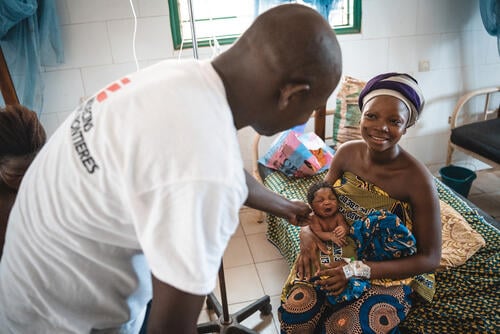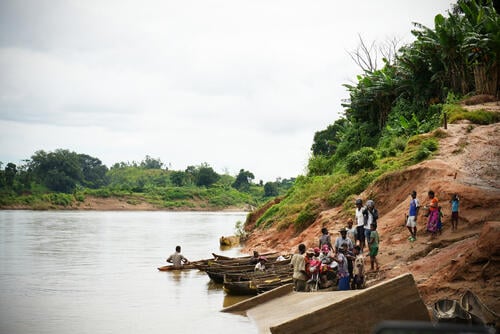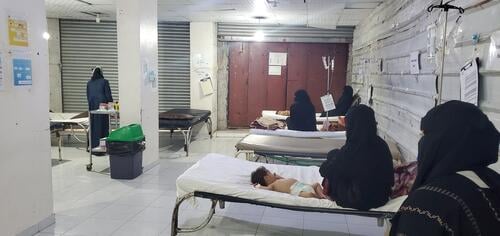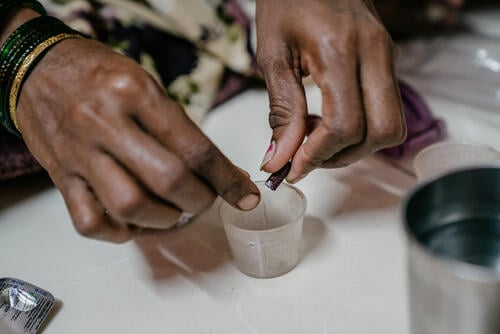After 15 years of absence, Médecins Sans Frontières (MSF) has returned to the west African country of Benin, where we have opened two projects in the past year. One in the southwest of the country, aimed at strengthening healthcare for mothers and children; and a second in the north, to assist people affected by malaria and by recent violence who are struggling to access medical care.
In the southwest department of Couffo, our teams work in four health centres and at a local hospital in an area where pregnant women and newborn babies face exceptionally high risks of dying before, during, or soon after childbirth. We work in the department which is in a country where maternal and neonatal mortality rates are already high.
I am the mother of three children, two of whom unfortunately died.Kèmy, one of our patients
A context of loss
Benin recorded 397 maternal deaths per 100,000 live-born children in 2020. This compares to a global average of 223 deaths, while this rate is just 8 out of 100,000 live-born children in Europe. Newborn babies in Benin are similarly at risk; the country’s neonatal mortality rate is 30 deaths per 1,000 births, compared to a global average of 18 deaths per 1,000.
Many of our patients have experienced the loss of a child.
“I am the mother of three children, two of whom unfortunately died,” says Kèmy, aged 23, who has already been bereaved twice. “The first died at the age of 18 months and the cause of his death are unknown. He died at home where he received traditional treatment.”
“My second child was stillborn at six months of pregnancy,” says Kèmy. “My third child was born at home with the help of a traditional birth attendant.”
Just 38 per cent of people in the Couffo department seek conventional medical care at the region’s health centres. This is partly due to a shortage of qualified health staff in the area, but it also reflects a reliance on traditional medicine and its beliefs. In addition, most women choose to give birth at home, which can increase the risks for those who experience complications.
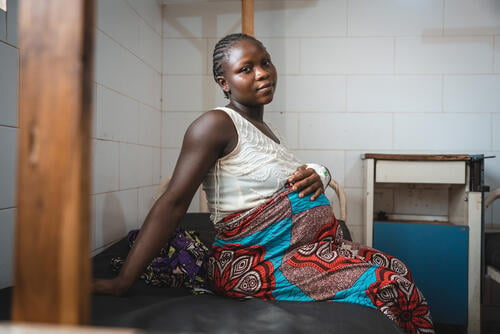
Working in, and with, the community
Our teams in Couffo have been providing pregnant women and new mothers with antenatal and postnatal care and helping them to give birth safely, with the ultimate aim of boosting survival rates among both mothers and newborns. Our teams will also soon provide care to victims and survivors of sexual violence.
“When I got pregnant, I went to the health centre immediately,” says Mireille, a new mother. She benefited from consistent medical care throughout her pregnancy and during childbirth. “The health workers in my village looked after me from the beginning of my pregnancy right through to giving birth. During my labour I had a complication, but because I was well taken care of, everything went well.”
Since our project opened in Couffo in October 2023, teams working in the four health centres of Toviklin, Tohou, Adjahonmé, Lokogba, and in the Klouékanmè zone hospital, have provided 8,044 antenatal and postnatal consultations and helped 2,677 women to give birth, including carrying out 797 emergency caesarean sections.
We have also provided the health centres with medical equipment, including oxygen concentrators, sterilisation equipment, and haemoglobin analysers, and are funding additional health staff. At the same time, we have run training sessions for existing health staff to strengthen their technical skills. As a result of these initiatives, patient numbers at all four centres and at the hospital have gone up.
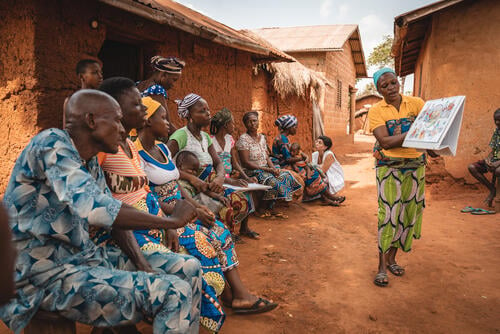
Our teams are also working with the wider community and encouraging them to take responsibility for the health of community members. We trained female volunteers in administering vaccinations and treating sexually transmitted infections, providing antenatal and postnatal care, and learning to spot warning signs during pregnancy and after childbirth. These women are now equipped to provide healthcare and advice for mothers and newborns. Training in care for victims and survivors of sexual violence, as well as safe-abortion and post-abortion care, will also be available to those who request it.
“Working with and inside the community is key”, says Ousmane Dakao, our project coordinator in Couffo.
“We have used different ways to gain the confidence of women and improve the number of patients attending the facilities,” says Dakao. “This has been through supporting the volunteer community members, providing free antenatal consultations, and through our health centre teams regularly travelling to outlying villages.”
We also plan to provide the community with tricycle ambulances in the coming months, to facilitate the transportation of pregnant women experiencing complications from their homes to health centres.
We have used different ways to gain the confidence of women and improve the number of patients attending the facilities.Ousmane Dakao, our project coordinator in Couffo
A deterioration of the security context
Our work in Benin does not stop there. At the other end of the country, we opened a malaria and emergency response project in August 2023 in the Atakora department in northwest Benin. There, a deteriorating security situation along the border with Burkina Faso has led to an increase of violence, and large numbers of people being displaced from their homes.
We also support the authorities in Benin in responding to any health and humanitarian emergency linked to conflicts, epidemics, or natural disasters. We have set up a monitoring and early warning system, and are supporting health facilities to put in place contingency plans for events such as large influxes of injured people.




